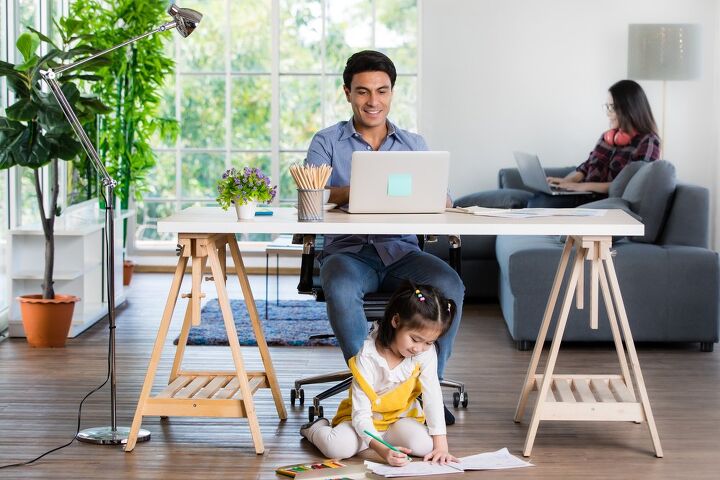How To Keep Work Separate When You Work From Home

The rise in remote work opportunities has increased the need for many people to create a viable home office space. If a good portion of your job happens in your house, it’s challenging to define the line between your personal and work lives. It’s tough to separate work from play when you work from home, especially if you live with others, but it’s possible.
Use a spare room as a home office, or set up a clearly defined workspace with a standing screen or curtains. Create and stick to a work schedule, and separate personal and work tasks. Change clothes when you start your work day, use different accounts and devices for your job and personal lives, and set clear boundaries with colleagues.
Clearly defining the break between work and personal life when you work from home is a physical and mental challenge. It’s important to practice habits that separate work from play, in your house and your head.
How To Separate Work From Personal Life When You Work From Home
How you choose to separate your work life from your personal life depends on several factors. You must consider the size of your home, the layout, the number of rooms, and how many people live with you. Therefore, as you read through these suggestions on how to keep work separate, choose the ones that make the most sense for your specific living situation.
However, many of these tips apply no matter if you live in a studio apartment or a five-bedroom home. Likewise, you’ll find many of these ideas helpful whether you live alone, with 10 roommates, five dogs, or three toddlers.
1. Utilize A Spare Room As A Dedicated Home Office
One of the most common ways to separate your work life when you’re at home is to convert a spare room into a home office. Whether it’s an extra living room, a spare bedroom, or an unused dining room, a dedicated room provides the ultimate privacy. It also enables you to completely shut the door, literally, on work when it’s time to call it a day.
For extra separation, make the room off-limits to anything that isn’t work-related. Furthermore, if it isn’t time for you to go to work, try to avoid entering the room as much as possible. The more you treat this space as only your office, the easier it will be to maintain a mental divide.
2. Set A Schedule For Work And Stick To It
If you went to an office or workplace every day, you'd have set hours that you were at work. But when you work from home, your hours on the job become muddy.
It becomes all too tempting to squeeze in an extra thirty minutes at the end of the day. Likewise, it’s easier to become distracted and mix a few personal chores or tasks into your workday.
Therefore, create a work schedule and stick to it, just as you would need to if you were going somewhere else. Build in your lunch break, and mini-breaks, and define what you will accomplish during each block of time. Having a schedule helps you stay accountable. It’s also helpful if you work from home while others are in the house if they know your work hours.
3. Get Dressed For Work
You wouldn’t go to your place of business in your PJs or sweats, so don’t wear them when you’re at home. Of course, this tip is personal and for some won’t make a difference. Some people are very productive even if they stay in yoga pants all day.
However, if you’re finding it hard to keep the line between work and your personal life separate, your clothes could make a difference. When it’s time to go to work, wear what you would wear if you had to go to an office, shop, or similar workplace. Then, when your workday is over, change into whatever clothes you would wear once you were home for the day.
4. If You Don’t Have A Spare Room, Create Separation With Screens Or Curtains
Not everyone has the luxury of a spare room they can convert into an office. However, it’s critical to give yourself as much physical separation as possible. The separation offers more privacy and also sets boundaries of where work ends and home life begins.
Carve out a corner in the living room, or place a desk in your bedroom. Then, add privacy by positioning a standing screen or hanging curtains from the ceiling. Another excellent divider is to use tall bookcases, with the shelves facing your office.
You might think this isn’t necessary if you don’t share the space with anyone else. However, even if you live alone, these physical dividers can help give you a sense of work being separate from home. Plus, they help block the view of your work from the rest of the space. After all, who wants to see piles of unfinished data sheets or files when they’re lying in bed?
5. Avoid Doing House Chores During Your Work Hours
When you’re working from home, try your best to only do work-related items during your designated schedule. Avoid the temptation to tackle laundry, do dishes, walk the dog, or do any other chores.
This tip is another one that depends on your personality, though. Some people find one of the big benefits of working from home is being able to tackle house chores before it gets late. But if you plan to do this, work some blocks into your schedule for a few home-related tasks and only do them during these times.
6. Don’t Bring Work Home With You (Even Though You’re Already There)
Similar to avoiding housework while you’re doing your job from home, don’t keep working when you should be done. In other words, don’t answer work emails in bed, don’t fire up the laptop after dinner to knock out an extra report. Prioritize your time wisely during your work hours, so you can leave work at work.
7. Create Separate Accounts For Work And Personal Life
Maintain separate accounts for your personal and work lives, including things like Google accounts, bank accounts, etc. Not only will this help you maintain a sense of separation, but it also makes things a lot easier to manage.
8. Consider Using Different Devices For Work And Play
If you have the means, use separate devices for work and personal use. For example, get a different phone, laptop, desktop computer, etc. for work use. If you have a dedicated home office space, the devices you use for work should remain in this space.
9. Be Clear With Colleagues About Time Boundaries
When you work from home, your colleagues typically know it. For many of them, they assume you’re reachable 24/7. It’s essential to let people know that you only accept calls or return emails during designated hours, barring an emergency.
The next step is once you let people know these boundaries, you need to stick to them. If you don’t follow through, they won’t take you seriously, and you’ll keep getting late-night phone calls.
And remember, even if you’re working from home, you still get to take a vacation or a sick day when needed. Don’t fall into the trap where even if you’re running 102 fever, you set up shop from your bed and go to work anyway. Things like this only further erase the line you're trying to draw between your personal and work lives.
10. Don’t Neglect Your Health, Family, Or Friends
It’s easy to get off your routine when you work from home. Many remote workers claim to neglect their workout regimen, make poorer food choices, snack more, and form bad sleeping habits. Make sure to take care of yourself, and don’t compromise your health because of your remote work schedule.
All Work And No Play Doesn’t Make Your House A Home
You’ve heard the saying, “All work and no play makes Jack a dull boy?” Well, similarly, if all you do when you’re at home is work, your house will feel pretty dull, and it certainly won’t feel like a home.
Clearly defining a boundary between your work and personal life is essential to your overall well-being and your productivity. A dedicated home office is great if you have room to spare, but if not, clearly define a space using a screen, curtains, or bookcases.
Set a schedule for your work day, get dressed, and go to work. Avoid doing personal stuff during these hours (unless you include a “break” for such things). Likewise, don’t continue working when your work day is complete. Practice healthy habits to stay fresh and focused, and be clear about your boundaries with your colleagues and loved ones.
Related Guides:

Stacy Randall is a wife, mother, and freelance writer from NOLA that has always had a love for DIY projects, home organization, and making spaces beautiful. Together with her husband, she has been spending the last several years lovingly renovating her grandparent's former home, making it their own and learning a lot about life along the way.
More by Stacy Randall



























